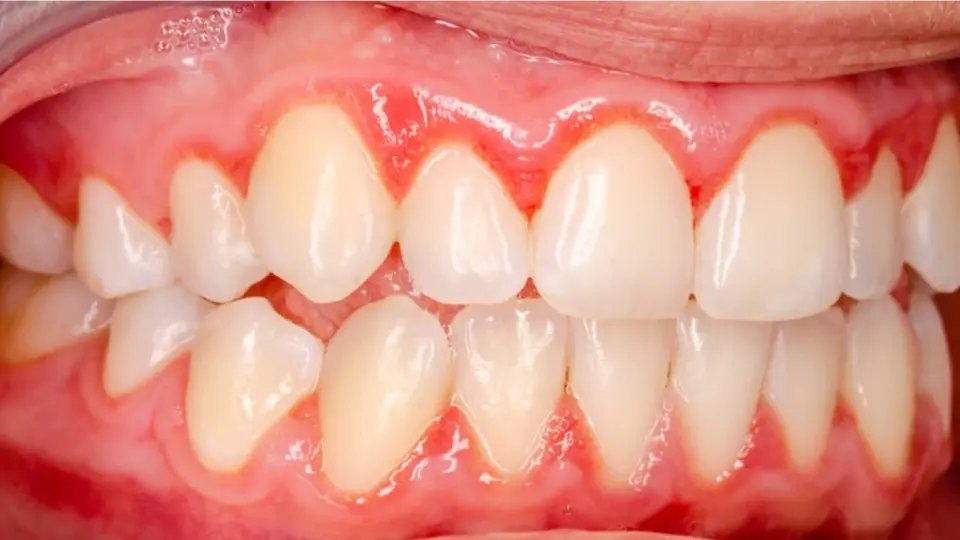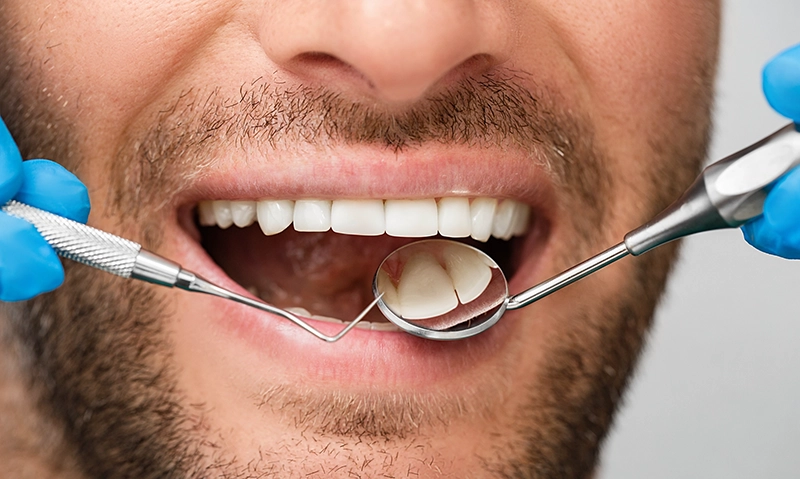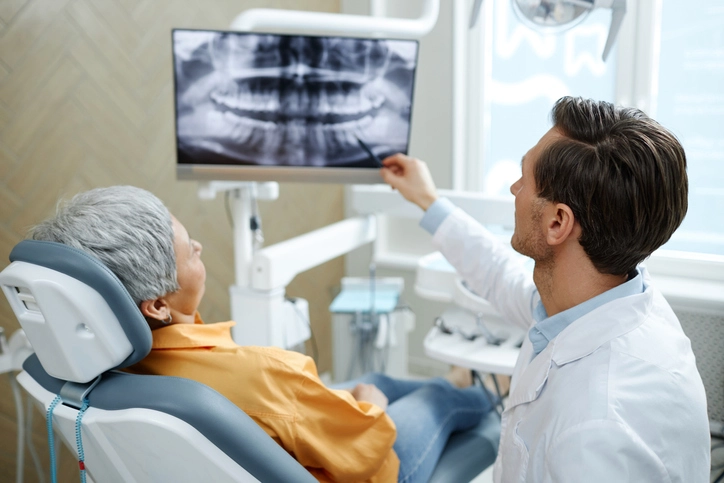A dental treatment known as a tooth extraction involves the removal of a tooth from its jawbone socket. Despite dentists’ best efforts, there are some cases where tooth extraction is the only option. Tooth decay or damage so severe that no other dental treatment has worked is a typical cause for tooth extractions.
In cases where the tooth is causing infection or posing a risk to surrounding teeth, extraction may be the best action to prevent further complications. Additionally, overcrowding or misalignment of teeth can require extractions to make space for orthodontic treatments like braces.
Wisdom teeth (third molars) can cause pain, infection, and need extraction or damage to adjacent teeth. It’s important to consult with a dentist to assess the need for tooth extractions and to explore appropriate alternative treatments if available.
Why are teeth extracted?
Teeth may be extracted for various reasons. One common cause occurs when additional dental operations do not relieve the suffering brought on by extensive tooth decay or destruction. In cases where the tooth is extensively decayed or fractured, extraction is necessary to prevent further complications and restore oral health. Another reason for extraction is advanced gum disease, which can make teeth loose and unstable. Removing affected teeth can prevent the spread of infection and improve overall oral health.
Additionally, impacted teeth may need extraction such as wisdom teeth, which often cause pain, infection, or damage to adjacent teeth. Tooth extraction may also be necessary for orthodontic treatment to address overcrowding or misalignment. Dentists try to keep natural teeth, but extraction becomes the best option in certain situations to ensure oral health and prevent complications.
Is tooth extraction painful?
Tooth extraction is typically not painful during the procedure due to the administration of local anesthesia, which numbs the area around the tooth to be removed. This ensures you won’t feel pain while the tooth is extracted.
However, it’s common to experience discomfort, soreness, and mild pain after the anesthesia wears off. This post-extraction discomfort is a normal aspect of recovery and can be treated with over-the-counter painkillers relievers recommended by your dentist or oral surgeon. Your dentist will provide specific instructions on pain management and care after the extraction.
There may be some swelling and noticeable discomfort in more complex cases, such as surgical extractions or the removal of impacted wisdom teeth. Dental and oral surgeons may give greater pain medication in such cases.
It’s important to carefully follow your dentist’s post-extraction care instructions to minimize pain, reduce the risk of complications, and promote a smooth recovery.
How long does recovery take?
The recovery duration after tooth extraction can vary depending on several things including your general health, the difficulty of the extraction, and how strictly you adhere to post-operative instructions. Here is a general timeline for the stages of recovery:
- Immediate Recovery (First 24 Hours): The initial recovery phase typically lasts for the first 24 hours after the extraction. You may experience some bleeding, swelling, and discomfort at the extraction site during this time. It’s essential to rest, avoid strenuous activities, and while dealing with pain, be sure to follow your dentist’s advice on wound care.
- Days 2-3: Swelling and bruising may peak around the second or third day after the extraction. Continue to rest and maintain a soft diet, avoiding hot, spicy, and hard foods. Over-the-counter pain relievers can help manage discomfort.
- Days 4-7: Swelling and bruising should begin to subside during this period. The extraction socket will gradually heal, and any stitches may be removed. Continue to follow your dentist’s instructions for oral hygiene and dietary restrictions.
- 2 Weeks to 3 Months: It may take a few weeks to a few months for the extraction site to fully recover depending on the complexity of the extraction. The socket will fill in with new bone and gum tissue during this time.
It’s crucial to attend any follow-up appointments scheduled by your dentist and adhere to their recommendations for oral care and dietary restrictions. You may have extreme discomfort, edema, bleeding, or signs of infection during recovery, contact your dentist promptly for further evaluation and guidance.
What are alternatives to extraction?
Tooth extraction is usually considered when there are no viable alternatives for preserving the tooth. Dentists aim to keep natural teeth whenever possible. However, in some cases, extraction may be the best or only option. Alternatives to extraction may include:
- Dental Fillings: Dental fillings can restore the tooth’s structure and function for teeth with small cavities or minor damage.
- Dental Crowns: Dental crowns are often employed for more extensive damage or decay. They cover every visible tooth and provide strength and protection.
- Root Canal Treatment: One root canal can save a tooth with diseased or damaged pulp. Remove the infected pulp, clean the inside, and fill or crown it.
- Orthodontic Treatment: In cases of misalignment or spacing issues, orthodontic treatment with braces or clear aligners can align teeth properly without requiring extraction.
- Periodontal Treatment: Advanced gum disease can lead to tooth mobility. Periodontal treatments such as scaling, root planing, or gum surgery may help stabilize the tooth and prevent extraction.
- Dental Implants: When a tooth is already missing, dental implants can replace it. Implants provide a strong and permanent solution for tooth replacement.
- Partial Dentures or Bridges: For individuals with multiple tooth loss, partial dentures, or bridges restore function and aesthetics.
The choice between extraction and these alternatives depends on the specific dental condition, the overall health of the tooth, and the patient’s goals. Dentists will thoroughly assess the situation and discuss the best treatment with the patient to achieve the best possible outcome for their oral health.
Can a dentist replace an extracted tooth?
Yes, a dentist can replace an extracted tooth with various therapeutic options that restore function and aesthetics.When damaged teeth are extracted, decay, or other reasons, it’s crucial to consider tooth replacement to maintain oral health and overall well-being.
- Dental Implants: Dental implants are successful and long-lasting tooth replacement. Titanium implants are surgically inserted in the jawbone to behave as a tooth root. Implants are topped with bespoke crowns to provide robust, natural-looking replacement teeth.
- Dental Bridges: Dental bridges are used when one or more adjacent teeth are missing. They consist of artificial teeth (pontics) anchored to neighboring natural teeth or dental implants. Bridges provide a stable and aesthetically pleasing option for filling the gap.
- Dentures: come in partial and full forms, providing comprehensive solutions for multiple missing teeth or complete arches. Modern dentures are designed to be comfortable and functional, restoring your ability to eat, speak, and smile confidently.
Your dentist will assess your specific dental condition, go over your choices with you and suggest which tooth replacement option is most suited to your specific requirements. Replacing an extracted tooth is essential to maintain oral function, prevent adjacent teeth from shifting, and enhance overall quality of life.
Seeking Professional Advice and Care for Tooth Extractions
At Paradise Dental Studio of Fort Lauderdale, we understand that tooth extractions can be a concerning prospect. That’s why we emphasize seeking professional advice and care.
When you choose our skilled dental staff, you’ll receive expert guidance and ensure your comfort. We carefully assess your dental needs, discuss alternatives, and recommend extractions only when necessary.
You can trust our skilled professionals to perform extractions with precision and care, minimizing discomfort and promoting a smooth recovery. The restoration of your oral health is another service that provides a smile’s function and aesthetics.
Your dental health is our priority, and we’re here to provide the highest level of professional care at Paradise Dental Studio. Contact us now!


